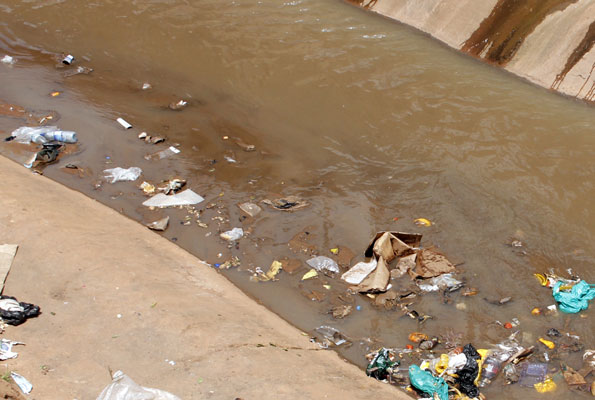Environmental protection is every one’s responsibility

Plastic bottles and polythene bag waste float on Nakivuubo Channel in Kampala recently. Environmentalists say such plastic waste clogs waterways and channels, causing floods and providing breeding sites for disease vectors. File photo
Public Finance Management Act (2015) of Uganda recognises environment as a cross-cutting issue. It is a requirement for all ministries, departments and agencies (MDAs) to integrate environmental issues in their work plans and budgets and also prepare quarterly reports on progress made in addressing environment challenges.
Globally, five out of the 17 Sustainable Development Goals (SDGs) are focusing on addressing environmental and climate-related issues. For instance, Goal 13; Climate action is focusing on integrating climate change issues in national polices and strategic plans, Goal 15; Life on land is urging nations to combat desertification, increasing afforestation, among others.
Leaders across the globe have demonstrated the much needed support towards environmental conservation. President Yoweri Museveni has always reminded citizens that it is everyone’s responsibility to see environmental protection as a “matter of life and death for humanity”.
Recently, President of Kenya, William Ruto, who is the current chairperson of the Committee of African Heads of State and Government on Climate Change (CAHOSCC) urged all nations to join efforts in addressing climate change issues during the 3rd Pan-African Parliament’s Summit on Climate Policy and Equity held under the theme: “The Continent at the Crossroads; Graceful just transition and NDCs implementation responsive to African development aspirations and economic realities”.
International financing trends show that there has been a decline in funding global investments. The potential funders are beginning to focus on financing mainly climate-smart investments. The current Permanent Secretary/ Secretary to the Treasury of Uganda, Ramathan Ggoobi, recently informed policy makers that Uganda’s economic focus should be on providing incentives to attract climate-smart financing. This was after attending the World Bank/IMF Annual Spring meetings in Washington DC.
Although Africa has always been globally described as a continent full of problems that include environmental and climate issues, the recent UN climate change statistics show that Africa is performing well in climate change management and indeed, it contributes the least share (7 percent to the world’s greenhouse gas emissions. However, this does not mean that we should relax on the efforts geared towards environmental protection and climate change management.
Even if some of the environmental protection and climate change measures might be having gaps in the law, citizens should not entirely focus on opposing but working with state and non-state actors to bridge the gaps.
We must therefore continue supporting policies aimed at protecting the environment and climate change management if we are to fully attain green economy that is a wish for every nation.
Davis Kwizera, Environmental enthusiast




